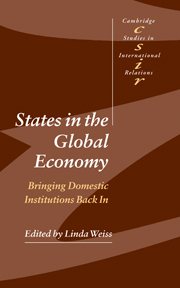Book contents
- Frontmatter
- Contents
- List of figures
- List of tables
- List of contributors
- Preface
- 1 Introduction: bringing domestic institutions back in
- Part I The resilience of welfare states
- Part II New economic challenges, changing state capacities
- Part III Governing globalisation
- List of references
- Index
- CAMBRIDGE STUDIES IN INTERNATIONAL RELATIONS
Preface
Published online by Cambridge University Press: 22 September 2009
- Frontmatter
- Contents
- List of figures
- List of tables
- List of contributors
- Preface
- 1 Introduction: bringing domestic institutions back in
- Part I The resilience of welfare states
- Part II New economic challenges, changing state capacities
- Part III Governing globalisation
- List of references
- Index
- CAMBRIDGE STUDIES IN INTERNATIONAL RELATIONS
Summary
It is often said that comparative and international political economy are sister disciplines which would benefit from greater cross-fertilisation. This volume takes a step in that direction by arguing the case for understanding the impact of globalisation on the state as being tightly connected with the character of domestic institutions (understood broadly as the embedded norms and organisational arrangements that shape interests and outcomes).
The idea for this volume grew out of a talk given at UCLA's Center for Social Theory and Comparative History in 1999. My talk took issue with the ‘top–down’, overly deductive nature of much of the globalisation literature and the way it rarely seemed to engage with what was happening to states ‘on the ground’, as it were. While many contributors to the globalisation–state debate have acknowledged that ‘institutions matter’, surprisingly few have given substance to that aphorism. Encouraged by the responses, I drew up an ‘A’ list of authors noted for work that was both well grounded in domestic institutions analysis and at the same time able to engage with the concerns of international relations scholars. Prospective co-authors were provided with an outline of the project's aims and rationale, along with key questions. In the interests of producing a tight volume, proposed collaborators were asked to indicate, if they intended to join the project, how their chapter would contribute to the aims of the book.
- Type
- Chapter
- Information
- States in the Global EconomyBringing Domestic Institutions Back In, pp. xiii - xivPublisher: Cambridge University PressPrint publication year: 2003

